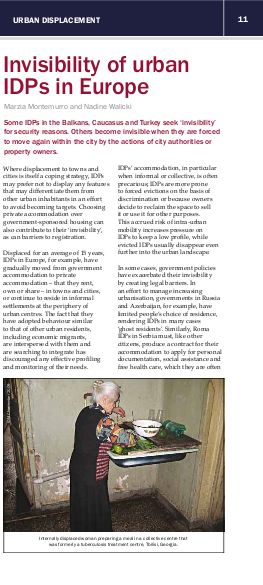
The article presents an overview of internally displaced people in European countries such as the Balkans, Caucasus and Turkey who have chosen to become virtually invisible in society so that they will not be forced to move again by city authorities or property owners. A discussion of the impact their decision to live in private accommodations in cities or informal settlements has had on the ability of humanitarian aid workers to profile the displaced people and monitor their needs is presented. The impact the large number of internally displaced people in urban settings has had on the ability of urban authorities to provide adequate services is discussed.
Resource collections
- Evaluating humanitarian action
- Monitoring and Evaluation (M&E)
- Monitoring of humanitarian action
- UN Habitat - Urban Response Collection
- Urban Response - Urban Crisis Preparedness and Risk Reduction
- Urban Response Collection - Community Engagement and Social Cohesion
- Urban Response Collection - Economic Recovery
- Urban Response Collection - Environment and Climate Change
- Urban Response Collection - Housing, Land and Property
- Urban Response Collection - Urban Crisis Response, Recovery and Reconstruction
- Urban Response Collection - Urban Resilience
- Use of evaluation evidence